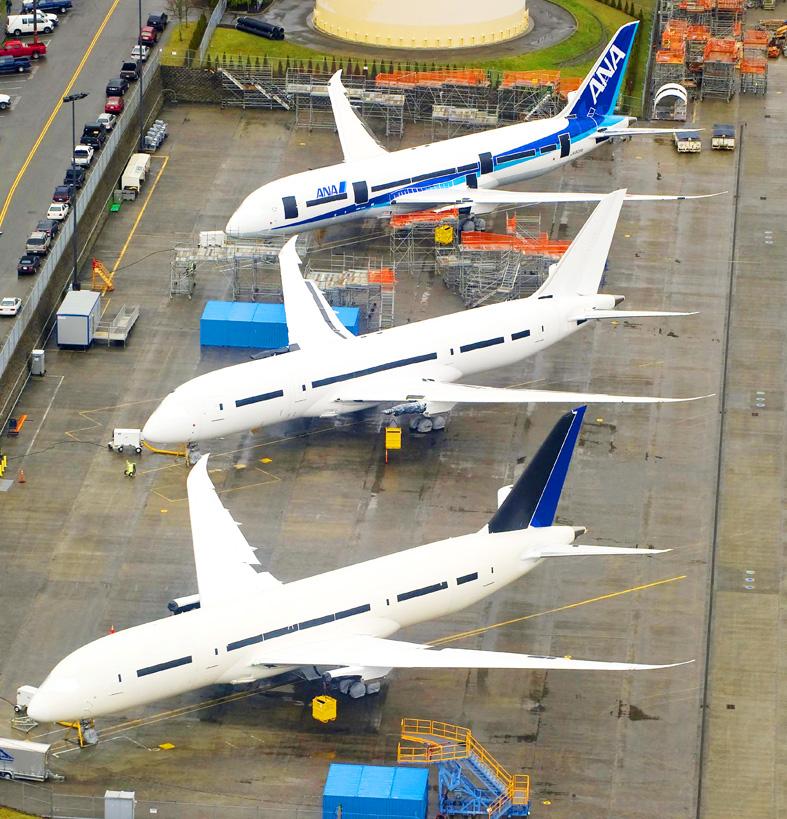Boeing Co has put forward a modified contract for about 2,500 union members at three defense locations in or near St Louis, Missouri, days after the workers voted to reject a previous draft and were set to begin a strike this week.
“This new offer builds on our previous strong, highly competitive one and directly addresses the issues raised by our employees,” a Boeing spokesperson said in a statement on Saturday. “We are hopeful they will vote ‘yes.’”
Members of the International Association of Machinists and Aerospace Workers District 837 acknowledged the new contract offer on the union’s Web site and said negotiations had been extended through Wednesday.

Photo: AFP
Priorities in the negotiations are wages, strengthening retirement plans and eliminating a two-tier wage system, the union said.
“We cannot accept a contract that is not fair and equitable, as this company continues to make billions of dollars each year off the backs of our hardworking members,” it said earlier last week.
The new contract would provide a US$8,000 lump sum that can be taken in cash or deferred to independent retirement plans while maintaining an existing Boeing retirement plan. It would also increase the hourly second-shift pay differential and provide wage increases for everyone in every year of the contract.
The workers in St Louis, nearby St Charles and Mascoutah, Illinois, build military aircraft including the F-15, F-18, T-7A trainer and the MQ-25 uncrewed refueler.
Boeing in May said it is moving its headquarters from Chicago to Arlington, Virginia, to be nearer decisionmakers at the Pentagon and elsewhere in the US government.
Separately, the company received preliminary US regulatory clearance to restart deliveries of its 787 Dreamliner aircraft, paving the way for the end to a drought that drained cash and dented the company’s reputation for quality.
The US Federal Aviation Administration (FAA) approved the company’s plan to repair manufacturing flaws in the Dreamliner’s carbon-composite frame, two people familiar with the plan said on Friday.
The jet manufacturer had largely halted deliveries since late 2020, when its engineers found improperly filled gaps in about 20 locations.
The FAA agreement is a milestone for the company, but it would not immediately resume sales.
Boeing must still make required fixes and get FAA inspectors to approve each aircraft, the people said.
While timing of delivery resumptions remains unclear, the company is aiming to begin in the week of Aug. 8, one of the people said.
A total of 120 of the jets, which retail for as much as US$338 million each, had been constructed, but were parked and waiting for FAA approval to resume sales, Boeing said in a statement.

To many, Tatu City on the outskirts of Nairobi looks like a success. The first city entirely built by a private company to be operational in east Africa, with about 25,000 people living and working there, it accounts for about two-thirds of all foreign investment in Kenya. Its low-tax status has attracted more than 100 businesses including Heineken, coffee brand Dormans, and the biggest call-center and cold-chain transport firms in the region. However, to some local politicians, Tatu City has looked more like a target for extortion. A parade of governors have demanded land worth millions of dollars in exchange

An Indonesian animated movie is smashing regional box office records and could be set for wider success as it prepares to open beyond the Southeast Asian archipelago’s silver screens. Jumbo — a film based on the adventures of main character, Don, a large orphaned Indonesian boy facing bullying at school — last month became the highest-grossing Southeast Asian animated film, raking in more than US$8 million. Released at the end of March to coincide with the Eid holidays after the Islamic fasting month of Ramadan, the movie has hit 8 million ticket sales, the third-highest in Indonesian cinema history, Film

Taiwan Semiconductor Manufacturing Co’s (TSMC, 台積電) revenue jumped 48 percent last month, underscoring how electronics firms scrambled to acquire essential components before global tariffs took effect. The main chipmaker for Apple Inc and Nvidia Corp reported monthly sales of NT$349.6 billion (US$11.6 billion). That compares with the average analysts’ estimate for a 38 percent rise in second-quarter revenue. US President Donald Trump’s trade war is prompting economists to retool GDP forecasts worldwide, casting doubt over the outlook for everything from iPhone demand to computing and datacenter construction. However, TSMC — a barometer for global tech spending given its central role in the

Alchip Technologies Ltd (世芯), an application-specific integrated circuit (ASIC) designer specializing in server chips, expects revenue to decline this year due to sagging demand for 5-nanometer artificial intelligence (AI) chips from a North America-based major customer, a company executive said yesterday. That would be the first contraction in revenue for Alchip as it has been enjoying strong revenue growth over the past few years, benefiting from cloud-service providers’ moves to reduce dependence on Nvidia Corp’s expensive AI chips by building their own AI accelerator by outsourcing chip design. The 5-nanometer chip was supposed to be a new growth engine as the lifecycle